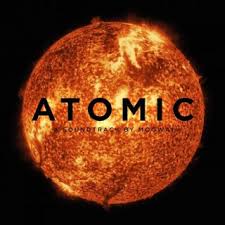Last year, Mogwai crafted a score to accompany the elliptical narrative of documentarian Mark Cousins’ brazen account of the nuclear age, Atomic: Living In Dread And Promise. Billed as their ninth album proper, the pieces released here are reworked, remastered and retooled versions of what graced the original production, and is talismanic in that it is the first time the band has put something to tape without John Cummings on board, the guitarist having left on his own tangential path last year. Yet this effort is far from foreign for them. Their first fully-fledged foray into soundtracks, 2006’s Zidane: A 21st Century Portrait, is one of the most mesmerising singular film scores made to be consumed outside its original context. More recently, and with the most obvious reference points, is the stellar work done for the French returned-dead drama series Les Revenants. That soundtrack saw Mogwai at their most bristlingly restrained – the constant threat of their imminent explosion, the centrifugal force of their back catalogue and the virile mainstay of their shock-and-awe power, was in this instance always imagined but never materialised. This somehow made Les Revenants all the more powerful due to the lack of catharsis – the true boogeyman, a knowing tip of the hat to their self-carved status, preferring to lurk in the shadows, a raw nerve of tension, rather than obliterate in a white-heat ball of fury.
Atomic doesn’t take an altogether different approach per se, but instead aims to mirror the zoetrope transformation and experimental artistry of Cousins’ imagery. The band have visited the Hiroshima peace park on their global travails, and the retroactive emotional scars that comes from touching the path of a Ground Zero of the past are evident. The documentary is an archival compendium, melding the Hiroshima attack with global disasters that have echoed through history’s halls since (the spiked stalemate of the Cold War, the implosions of Chernobyl and Three Mile Island, the natural disaster that precipitated Fukushima’s meltdown) as well as the healing nature of the same technology, and Mogwai feed into its mosaic portraiture of destruction and hope. The slow-build euphoria of ‘Ether’ is an interesting opening gambit, a shimmering beacon of light, mirroring the endless possibilities of scientific advancement. ‘SCRAM’ is a sonar flare, reaching back into Louis & Bebe Barron ‘s Forbidden Planet dreamlike stasis, stuttering dub inflections and widescreen Gothic dystopia, the undercurrent of growling guitar more post-metal in its esotericism.
‘Bitterness Centrifuge’ and ‘Tzar’ could be viewed as the most Mogwai-esque tracks here, deliberate ostentatious squalls, in thrall to the magisterial nightmare of nuclear fission at its most dire – yet there is not a guttural dirge or apocryphal roar in sight. It’s here that the gloss and veneer of latter-day Mogwai and the cineaste ideal of sweeping scores merge – Barry Burns and Stuart Braithwaite’s burgeoning predilection for lurking electronica manifest.
Elsewhere it’s the blueprint construct of Mogwai that peeks out from beneath computerised grandiosity and flamboyant zeal – both ‘Little Boy’ (the name of the bomb dropped on Hiroshima) and ‘Are You A Dancer’ (a play on a series of photos of a ballet dancer shown in front of nuclear test mushroom clouds) are straight out of the elegant melancholy moments of Come On Die Young, the former with Vangelis lode running undertones, the latter pockmarked and augmented by stammering, sonorous violin.
‘Pripyat’ ups the ante and then some – named after the abandoned city forever tainted by the Chernobyl fallout, it is a funereal march into the wastelands, borrowing from glacial doom metal derivatives and phased drone, yet with an ear for crystalline melody and a taste for the spine-chilling. Closer ‘Fat Man’ (the bomb that blew up over Nagasaki) is stark yet a fitting counterpoint – Burns’ piano echoing out into the darkness, stabs of hard ivory in a black vacuum, before the humming nodes zoom in and out, the composition rising in earnest urgency, finally proffering a harsh-tinged blast aboard a golden wave of noise, albeit a short, almost insubstantial swell.
Atomic toys with computer histrionics more than their sojourns into experimental electronica has in the past, but it also aims to maintain a heady sense of purpose, of sincerity, of seriousness, that every Mogwai release to date has always had the sense to undermine. The reason the Glaswegians are one of the few post-rock affiliated acts that have stood the test of time is their understanding of brevity and longevity, harsh noise emulsion and spider’s web deftness, black-hole rage and giddy self-effacement. The calibration of these elements isn’t evident here – but then again, that is not the point. As Braithwaite himself has noted, Atomic has been ‘one of the most intense and fulfilling projects we have taken on as a band.’ Atomic is a conceptual artwork that is overshadowed and at times overburdened by its subject matter. Yet taken in this context it holds a brutalist, otherworldly thrall all its own.


